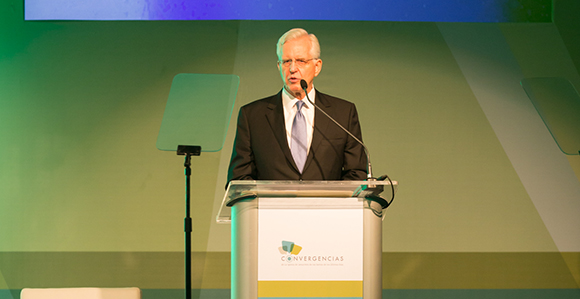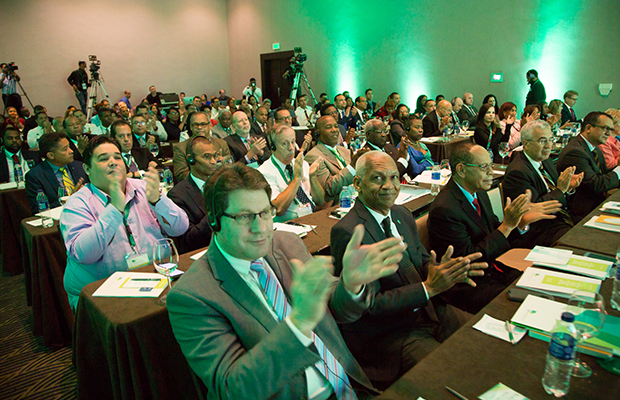How the Watergate Scandal Taught Elder Christofferson to Always Follow His Conscience
Contributed By Jason Swensen, Church News associate editor

Elder D. Todd Christofferson speaks about the importance of following one’s conscience during his keynote address at the Ethics and Integrity in Business Conference November 13, 2018, in Santo Domingo, Dominican Republic.
Article Highlights
- Elder Christofferson clerked for then-chief judge Sirica during the height of the Watergate scandal.
- Avoid becoming numb to your conscience by always following it.
- Strengthen your conscience by serving and keeping your focus on others rather than yourself.
“My hope for avoiding the possibility of a similar catastrophe in my own life lay in never making an exception—always and invariably submitting to the dictates of an ethical conscience.” —Elder D. Todd Christofferson of the Quorum of the Twelve Apostles
Related Links
While serving as a young law clerk, Elder D. Todd Christofferson made a defining decision that continues to guide his life: no matter the circumstances, always submit “to the dictates of an ethical conscience.”
“Putting one’s integrity on hold, even for seemingly small acts in seemingly small matters, places one in danger of eventually losing the benefit and protection of conscience altogether,” he declared in his recent keynote address at a business ethics conference in the Dominican Republic.
Entitled “Ethics and Integrity in Business: How Fair Play Yields Better Results,” the November 13 conference drew participants from government, business, media, and academia from across the Caribbean. Cosponsors included the Church, Brigham Young University’s Marriott School of Business, and the Dominican Republic’s General Directorate on Ethics and Integrity in Government.
A member of the Quorum of the Twelve Apostles, Elder Christofferson drew upon his “ringside seat” to the Watergate political scandal to teach the essentialness of conscience. That pivotal moment in American history enabled the young lawyer to learn “crucial life lessons” that continue to serve him well.
After graduating from law school in 1972, he began clerking for Judge John J. Sirica, then-chief judge of the U.S. District Court in Washington, D.C. That clerkship coincided with the Watergate proceedings directed largely by Judge Sirica.
Watergate culminated, of course, in the political demise of Richard Nixon. The American president’s efforts to cover up the scandal—infamously immortalized in tape recordings of meetings in the Oval Office—resulted in him becoming a co-conspirator in the break-in at the Democratic National Committee headquarters at the Watergate office complex.
During the Watergate investigation, Nixon’s recordings were subpoenaed. Judge Sirica and his clerk (and future Apostle) Todd Christofferson listened to all the tapes in chambers.
“After we listened to and discussed each taped conversation, the judge determined what was relevant to the investigation,” said Elder Christofferson. “The tapes showed President Nixon’s complicity in the illegal cover-up, but no definitive evidence that he was in any way involved with the initial break-in.”
Nixon was, in Elder Christofferson’s assessment, a “basically decent [man].” But his decisions to whitewash the crime occurred when the president opted not to assert his conscience.
“Conscience is a defining personal imperative that stirs deep in the soul of each person,” he said. It is that “invisible space” in the heart and mind where right and wrong are decided, making one a human being.
“Not all consciences come to the same conclusion on every matter—personalities, perspectives, histories, and circumstances are too diverse for that—but they tend to promote the greater good, not serve personal interests or the demands of blind ideology.”
Decades later, Elder Christofferson still wonders why Nixon allowed the Watergate scandal to grow and fester. Over time, the president’s conscience apparently grew increasingly numb.
“The life lesson I took away from [Nixon’s] experience was that my hope for avoiding the possibility of a similar catastrophe in my own life lay in never making an exception—always and invariably submitting to the dictates of an ethical conscience.”
A weak or numbed conscience opens the door for personal “Watergates.” It brings about disasters “that can hurt and destroy both the guilty and the innocent.”
Forces are in play, he added, that would dilute the influence of conscience in society and culture by seeing it more as granting license than as imposing duties.
“The concept that conscience entitles one to do whatever he likes derives from moral relativism,” he said. “By moral relativism, I mean the belief that no moral claim can be verified as objectively true or false or better than any other—that ethical or moral truths depend on the attitudes and feelings of those who hold them, and that no one can judge the validity of someone else’s ‘truth.’”
But real conscience holds one to a higher standard based on “fixed moral concepts and values” such as justice, mercy, love, honesty, generosity, self-restraint, and integrity that exist “apart from personal preference.”
There are moral absolutes, he said. Truth and moral concepts cannot be based on whim and personal preference.
“Underneath the diversity of human experience, we somehow find a way to agree on what it means to be good—loving your neighbors, caring for the poor, protecting the most vulnerable, keeping family obligations, controlling selfish appetites, serving a higher purpose than mere survival, and much more.”
The general acceptance of so many common standards suggests they derive from a common source that some call “moral sense” and others may call “common sense” or “practical wisdom.”
But for Elder Christofferson, two statements of scripture confirm this “universal instinct.”
First, a declaration from Christ in Doctrine and Covenants 93:2: “I am the true light that lighteth every man that cometh into the world.”
And second, from Moroni 7:15–16: “It is given unto you to judge, that ye may know good from evil; and the way to judge is as plain … as the daylight is from the dark night. For behold, the Spirit of Christ is given to every man, that he may know good from evil.”
When acknowledged and followed, conscience leads to light and truth. “My plea is that we all maintain a conscience that is a robust and uncompromising guide,” he said.
Elder Christofferson concluded his keynote address with a suggestion that he is certain would strengthen one’s conscience.
“A life devoted to service to others allows conscience to flourish,” he said. “Service provides a natural barrier against the ills that flow in the wake of self-will and self-interest. A focus outside ourselves and beyond personal autonomy and personal pleasure will protect and strengthen conscience.
“As Jesus said to His Apostles, ‘Whosoever will be great among you, shall be your minister: and whosoever of you will be the chiefest, shall be servant of all’ (Mark 10:43–44).”

Participants at the Ethics and Integrity in Business Conference in the Dominican Republic applaud following Elder D. Todd Christofferson’s keynote address on November 13, 2018.
